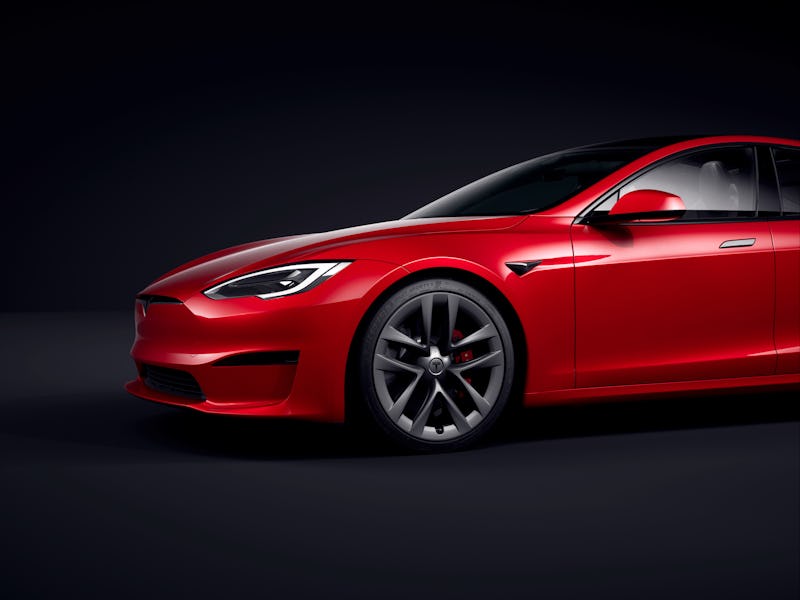Tesla: why Elon Musk is ‘probably right’ about bold electric vehicle claim
Tesla CEO Elon Musk announced this week that a longer-distance iteration of the Tesla Model S is now canceled.

Tesla has canceled its long-range Tesla Model S, originally set for launch next year — but that may not be such a big issue.
Last week, Tesla CEO Elon Musk revealed that the Tesla Model S Plaid+ version, expected to launch in mid-2022, has been shelved. The premium sedan was expected to feature a battery range of over 520 miles between charges, far more than the 390 miles on the model expected to launch later this week.
Musk claimed that, above 400 miles, battery range doesn’t really matter anymore. Sam Abuelsamid, principal analyst for e-mobility at Guidehouse Insights, says that Musk might not be wrong.
“To be honest, he's probably right that most people don't need an EV with more than 400 miles of range,” Abuelsamid tells Inverse.
Want to know more about why Tesla may have canceled the Model S Plaid+, what it could say about the company, and what it means for competition like the Lucid Air? Read the second part of our interview with Abuelsamid on Friday, only in MUSK READS+.
Tesla first released the Model S premium sedan in 2012. The firm currently sells a $78,490 standard model with a battery range of 412 miles, top speed of 155 mph, and 0 to 60 mph acceleration times of 3.1 seconds.
In February 2021, Tesla announced a $118,490 Plaid model with a battery range of 390 miles, top speed of 200 mph, and 0 to 60 mph acceleration times of 1.99 seconds. Tesla is set to hand over the first models of this car at a special event on Thursday.
But Tesla also announced a $148,490 Plaid+ model in February 2021, with a much further-out release date of mid-2022. While that car offered the same top speed and acceleration times, it had a much higher range of more than 520 miles.
The new Model S has a more minimalist interior, similar to the entry-level Tesla Model 3.
Musk told Electrek that this wasn’t an issue:
“What we are seeing is that once you have a range above 400 miles, more range doesn’t really matter. There are essentially zero trips above 400 miles where the driver doesn’t need to stop for restroom, food, coffee, etc. anyway.”
He also wrote on Twitter that there is “no need” for the Plaid+ model because “Plaid is just so good.”
Abuelsamid agreed that extra range probably doesn’t make much difference, especially as many people will travel much shorter distances every day.
“At 250 miles even when you factor in cold weather conditions, you still have about 150 miles which will meet almost everyone's daily needs,” he says. “For the occasional road trips, you're probably better off renting a gas vehicle than hauling around enough batteries for 500 miles of range every day.”
Indeed, research from automaker Sono Motors found the average German commutes just 10 miles per day. A 2018 study found that the average American commute is only around 30 minutes.
But while a 520-mile car might have somewhat limited appeal over a 390-mile car, Abuelsamid thinks there’s another reason why Tesla has dropped the car from its lineup. Tesla may have been constrained by factors out of its control — which Abuelsamid will explore more later this week.
TO READ THE SECOND PART OF THE INTERVIEW, SUBSCRIBE TO MUSK READS+.
Here is what you will gain from subscribing to MUSK READS+:
- Three emails per week, enabling fans to go deeper into the week’s news.
- Original interviews and reporting, longform analysis, previews, and recaps of major events, including earnings calls and more.
- Community-focused extras like responses to reader mail, an upcoming event calendar, and notable anniversaries.
- An archive of previous subscriber-only content, so you can easily read back over what you might have missed.
- Promotional deals and offers.
- Supporting original, independent journalism.
MUSK READS+ is a fully independent operation. We are not Elon Musk, nor are we employed by him. Our job is to report the events we find newsworthy, giving you the inside look at the worlds of space rockets, electric cars, clean energy, and more. It means first-hand accounts of a SpaceX rocket launch, Tesla insights from third-party analysts, and more.
If you want to support us in our mission, and receive original interviews and analysis, consider contributing with a subscription.